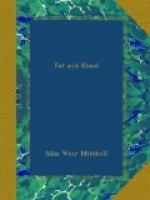had been made to break her of this habit, but in vain.
Her medical attendant had recognized the existence
of a retroflexion, but no pessary remained
in situ
for more than a day or so, and he suspected that she
herself pulled them out. I was unable to do more
than confirm the diagnosis that had been made as to
her local condition, but the pessary I introduced
shared the fate of its predecessors, and she remained
in the same condition,—in no way benefited
by my visit. Things going on from bad to worse,
Dr. Julius sent her to London for treatment in the
early part of December. I now determined to try
the effect of the method I am discussing, of which
I knew nothing when I first saw her. It was commenced
on December 11, and everything went on most favorably.
A week after it was begun, when her attention was
fully occupied with the diet, massage,
etc.,
I introduced a stem pessary, being tempted to try this
instrument, which I rarely use, by the knowledge that
she was at perfect rest, and that no form of Hodge
had previously been retained. I do not think
she ever knew she had it, and it remained
in situ
for a month, when I removed it and inserted a Hodge,
which was thenceforth kept in without any trouble.
I may say that I do not think the retroflexion had
much to do with her symptoms, except, doubtless, at
the commencement of her illness, and she probably
would have done quite as well without any local treatment.
She rapidly gained flesh and strength, and very soon
I entirely stopped both chloral and morphia, and she
never seemed to miss them. On December 11, when
the treatment was commenced, she weighed 5 st. 9 lbs.
On January 20 she weighed 7 st. On January 25
she walked down-stairs, and went out for a drive,
and from that time she went out twice daily.
She complained of no pain of any kind, and, although
she wore a Hodge, she did not seem to have any uterine
symptoms. On February 1 she went to the sea-side,
looking rosy, fat, and healthy, and has since returned
to her home in the country, where she remains perfectly
strong and well. A few days ago she came to town,
a long railway journey, on purpose to announce to
me her approaching marriage.”
“On September 10 a gentleman came to consult
me on the case of his wife, in consequence of his
attention having been directed to my former papers
by a relative who is a well-known physician in London.
He informed me that his wife was now fifty-five years
of age, and that she had passed ten years of her married
life in India. At the age of thirty she was much
weakened by several successive miscarriages, and then
drifted into confirmed ill health. He wrote,
on making an appointment, as follows: ’I
will give you at once a short outline of her case.
We have been married thirty-four years, of which the
last twenty have been spent by her in bed or on the
sofa. She is unable even to stand, and finds the
pain in her back too great to admit of her sitting
up. She is utterly without strength, of an intensely
nervous temperament, and suffers incessantly from
neuralgia. She has, moreover, an outward curvature
of the spine. There is not the slightest symptom
of paralysis. Fortunately, she does not touch
morphia, or any narcotic or stimulant, beyond a glass
or two of wine in the day. That she has long
been in a state of hysteria is the opinion of nearly
all the many medical men who have seen her.’




